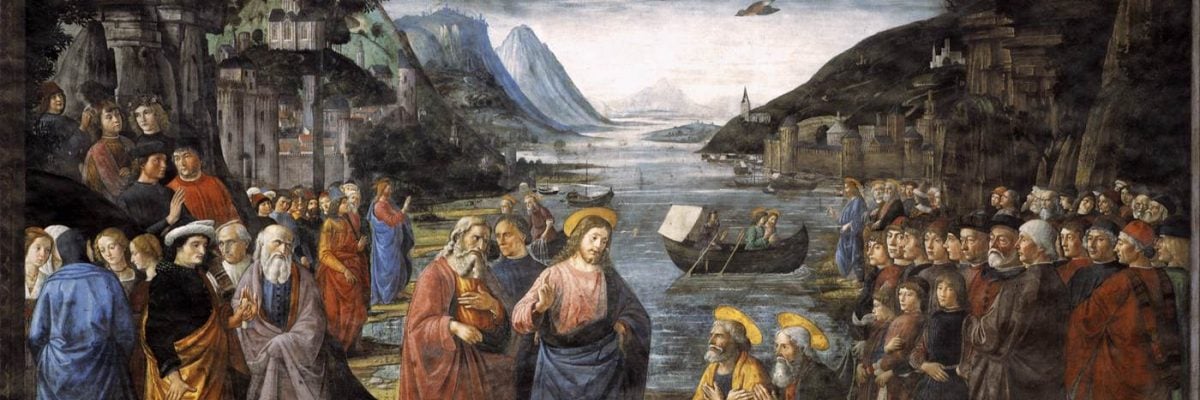
Homily for the Third Sunday of Ordinary Time, Year B
After John had been arrested,
Jesus came to Galilee proclaiming the gospel of God:
“This is the time of fulfillment.
The kingdom of God is at hand.
Repent, and believe in the gospel.”As he passed by the Sea of Galilee,
he saw Simon and his brother Andrew casting their nets into the sea;
they were fishermen.
Jesus said to them,
“Come after me, and I will make you fishers of men.”
Then they abandoned their nets and followed him.
He walked along a little farther
and saw James, the son of Zebedee, and his brother John.
They too were in a boat mending their nets.
Then he called them.
So they left their father Zebedee in the boat
along with the hired men and followed him.
— Mark 1:14-18
In the sixteen chapters of the briefest of Gospels, that of St. Mark, who was the young disciple of St. Peter who mysteriously fled from the garden of Gethsemani undressed, he uses the expression immediately or suddenly or straightaway forty times. And in this first chapter of his Gospel, as though to impress this personal usage on us, he uses this expression ten times.
Sadly, though, the translators of the Gospel passage we hear today chose to omit two of these. In what we have just heard the text should read, “Then they immediately abandoned their nets and followed him,” and, further on, “Then immediately he called them.” Other approved Catholic translations, as well as the non-Catholic ones all, translate these words serenely, but for some reason the translators of our version for use at Mass do not. Suffice it to say that the official original Latin version of the Lectionary for Mass has a complete translation.
This is not to point out or to complain about translations. Translations are of supreme importance in human culture, and anyone who has ever tried to translate accurately from one language to another knows how difficult a task this can be.
But the Gospel according to Mark is practically dominated by this adverbial theme, and so it would be good for us to consider its spiritual value.
In classical language, both pagan and biblical, the use of the adverb immediately or suddenly indicates an intersection of two orders: the natural and the supernatural, the visible and sensible, the invisible and intelligible. It tells of an unexpected revelation that comes from above and does not require human effort for its accomplishment. It tells, in other words, of the working of grace, which is always the sudden, unmerited, supernatural intervention in our mundane and fallen world and in our fallen and unruly hearts.
“Suddenly there was with the angel a multitude of the angelic host” to announce the birth of the Savior at Bethlehem. “Suddenly there flowed forth blood and water” to bring about the salvation of the world and the holy sacraments on Calvary. “Suddenly a sound came from heaven like the rush of a mighty wind” as the promised Holy Spirit filled the apostles on Pentecost. This suddenness is the sign of a work that is purely heavenly and divine.
Earthly things progress more or less slowly; they evolve, they progress and regress; but things that are immediately from God come about immediately. “Let there be light” is the first such sign in creation, and the last will be the Lord’s command to rise on the last day.
The Gospel lesson for this Sunday shows another consoling aspect of this “suddenness” of God’s work. It pertains not only to the grand mysteries of faith, like the Incarnation, the Passion, the Descent of the Holy Spirit, Creation, and the Last Day, it pertains to God’s intervention in each one of our individual lives. Just as the great events of salvation are described as immediate or sudden, so too, in their individual vocations, the apostles follow the Lord immediately, and he, on seeing them, calls them immediately.
When we receive any grace, we receive an effect of God’s goodness, which is like its cause—that is, simple, eternal, perfect, all-at-once. The forgiveness of sins is instantaneous, the infusion of sanctifying grace is instantaneous, the conception of a human person is instantaneous, the presence of the Body and Blood of the Lord is instantaneous. This is an aspect of works that only God and spiritual beings can accomplish.
We speak of “love at first sight.” The suddenness of God’s gifts is well compared to this life-changing human experience. He loves us and draws us to himself at every moment. At the moment we respond willingly to his constant wooing of us, all of whom he loves “at first sight,” he pours out his goodness on us, giving us the forgiveness of sins, new graces, and even his own self in the sacrament of the altar. This powerful and charming quality of God’s work with us drew the apostles to leave everything and follow the Savior. And whenever they drew back or failed, his grace was there to restore them instantly.
We could show our gratitude for the many times we have had our sins, which take a lot of time and effort, forgiven all at once, that Christ’s grace has flooded our hearts as he comes into our very bodies with his own eucharistic body, that we were in an instant bound for life to the one to whom we said, “I take you as my wedded spouse.”
Each of our lives is made of instants in the midst of the flow of time. It is in the present, immediate, sudden instant that God is working in us and for us to bring us to good. This is a powerful and consoling truth. It means that whatever struggles we have, the things of God and heaven are here and now intersecting with our world, making us new, and giving us new grace until we reach the happy instant of our entrance into the joy of the single, simple joy of the sight of God’s face, and then the instant of our bodily resurrection when Christ will say to us, “Arise!”



